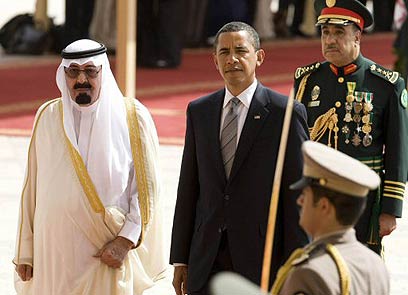
US President Barack Obama is set to give an historic speech at a university in Cairo Thursday, in which he plans to discuss joint values and mutual respect.
In Israel some are hoping the speech will help to promote reconciliation with the Arab world, but a senior Foreign Ministry official said Wednesday night that Jerusalem is awaiting the speech with "suspense and embarrassment", due to fears of the consequences it may have on relations with the US.
However officials have postulated that no great change would be instigated in the Middle East by Obama's groundbreaking appearance in Cairo. They said the speech would most likely let moderates in the Arab world know that Washington supported them in order to better the US' stance with the Arab public.
Israeli ministers have abstained from commenting on the speech for fear that it would further deteriorate relations with Washington, which are already strained over its demand to freeze all settlement activity.
"With Obama's tough behavior, demanding additional concessions from Israel, which has already given so much, there is no need to deteriorate relations further," said one of the ministers.
The president's speechwriter, Ben Rhodes, said Obama plans to work on the speech until the final moments beforehand. Officials in Washington say the speech does not include any presentation of a new US policy in the Middle East.
According to him, Obama will not present a detailed plan, but rather offer his take on how the conflict can be resolved.

Saudi king greets Obama (Photo: Reuters)
Rhodes hinted that the president will reiterate the commitment of all parties involved to the Road Map initiative.
The speech will be circulated by the US administration in the Muslim world in four languages: Arabic, Persian, English and Urdu (Pakistan's national language). According to Rhodes, Obama will mention the Israeli-Palestinian conflict and what can be done to resolve it.
Obama told New York Times' columnist Tom Friedman on Tuesday that "there are a lot of Arab countries more concerned about Iran developing a nuclear weapon than the ‘threat’ from Israel, but won’t admit it.
He added that there are a lot of Israelis, “who recognize that their current path is unsustainable, and they need to make some tough choices on settlements to achieve a two-state solution — that is in their long-term interest — but not enough folks are willing to recognize that publicly.”
The president was further quoted by Friedman as saying that there are many Palestinians who “recognize that the constant incitement and negative rhetoric with respect to Israel” has not delivered a single “benefit to their people and had they taken a more constructive approach and sought the moral high ground” they would be much better off today — but they won’t say it aloud.
Yitzhak Benhorin contributed to the report















